
Aargau, more formally the Canton of Aargau, is one of the 26 cantons forming the Swiss Confederation. It is composed of eleven districts and its capital is Aarau.
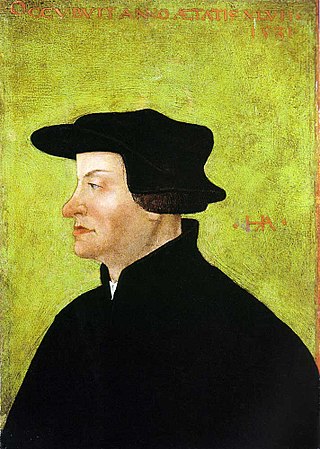
Huldrych or Ulrich Zwingli was a leader of the Reformation in Switzerland, born during a time of emerging Swiss patriotism and increasing criticism of the Swiss mercenary system. He attended the University of Vienna and the University of Basel, a scholarly center of Renaissance humanism. He continued his studies while he served as a pastor in Glarus and later in Einsiedeln, where he was influenced by the writings of Erasmus.
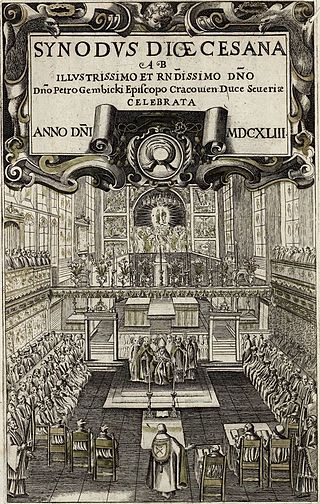
A synod is a council of a Christian denomination, usually convened to decide an issue of doctrine, administration or application. The word synod comes from the Ancient Greek σύνοδος 'assembly, meeting'; the term is analogous with the Latin word concilium'council'. Originally, synods were meetings of bishops, and the word is still used in that sense in Catholicism, Oriental Orthodoxy and Eastern Orthodoxy. In modern usage, the word often refers to the governing body of a particular church, whether its members are meeting or not. It is also sometimes used to refer to a church that is governed by a synod.
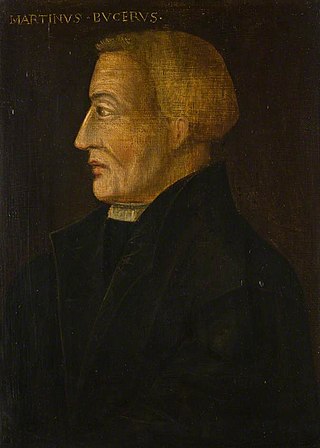
Martin Bucer was a German Protestant reformer based in Strasbourg who influenced Lutheran, Calvinist, and Anglican doctrines and practices. Bucer was originally a member of the Dominican Order, but after meeting and being influenced by Martin Luther in 1518 he arranged for his monastic vows to be annulled. He then began to work for the Reformation, with the support of Franz von Sickingen.

Heinrich Bullinger was a Swiss Reformer and theologian, the successor of Huldrych Zwingli as head of the Church of Zürich and a pastor at the Grossmünster. One of the most important leaders of the Swiss Reformation, Bullinger co-authored the Helvetic Confessions and collaborated with John Calvin to work out a Reformed doctrine of the Lord's Supper.
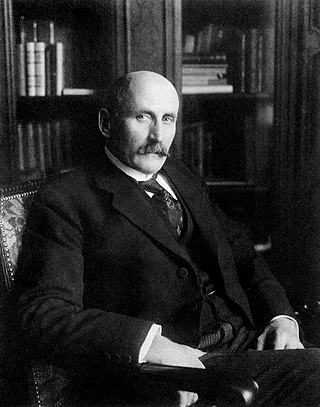
Felix Louis Calonder was a Swiss politician, member of the Swiss Federal Council from 1913 to 1920, and President of the Confederation in 1918. He was affiliated to the Free Democratic Party. During his tenure of office, he held the Department of Home Affairs from 1913 to 1917, and the Political Department from 1918 to 1919. As of 2022, Felix Calonder has been the Federal Council's only native Romansh speaker.

Conrad Grebel, son of a prominent Swiss merchant and councilman, was a co-founder of the Swiss Brethren movement.
The Gregorian Reforms were a series of reforms initiated by Pope Gregory VII and the circle he formed in the papal curia, c. 1050–80, which dealt with the moral integrity and independence of the clergy. The reforms are considered to be named after Pope Gregory VII (1073–85), though he personally denied it and claimed his reforms, like his regnal name, honoured Pope Gregory I.

Felix Manz was an Anabaptist, a co-founder of the original Swiss Brethren congregation in Zürich, Switzerland, and the first martyr of the Radical Reformation.

Andreas Rudolph Bodenstein von Karlstadt, better known as Andreas Karlstadt, Andreas Carlstadt or Karolostadt, in Latin, Carolstadius, or simply as Andreas Bodenstein, was a German Protestant theologian, University of Wittenberg chancellor, a contemporary of Martin Luther and a reformer of the early Reformation.

The Protestant Reformation in Switzerland was promoted initially by Huldrych Zwingli, who gained the support of the magistrate, Mark Reust, and the population of Zürich in the 1520s. It led to significant changes in civil life and state matters in Zürich and spread to several other cantons of the Old Swiss Confederacy. Seven cantons remained Catholic, however, which led to intercantonal wars known as the Wars of Kappel. After the victory of the Catholic cantons in 1531, they proceeded to institute Counter-Reformation policies in some regions. The schism and distrust between the Catholic and the Protestant cantons defined their interior politics and paralysed any common foreign policy until well into the 18th century.

Leo Jud, known to his contemporaries as Meister Leu, was a Swiss reformer who worked with Huldrych Zwingli in Zürich.
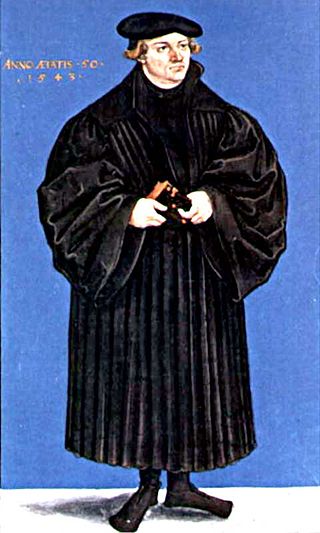
Justus Jonas, the Elder, or simply Justus Jonas, was a German Lutheran theologian and reformer. He was a Jurist, Professor and Hymn writer. He is best known for his translations of the writings of Martin Luther and Philipp Melanchthon. He accompanied Martin Luther in his final moments.
The hierarchy of the Catholic Church consists of its bishops, priests, and deacons. In the ecclesiological sense of the term, "hierarchy" strictly means the "holy ordering" of the church, the Body of Christ, so to respect the diversity of gifts and ministries necessary for genuine unity.
The Swiss Brethren are a branch of Anabaptism that started in Zürich, spread to nearby cities and towns, and then was exported to neighboring countries. Today's Swiss Mennonite Conference can be traced to the Swiss Brethren.
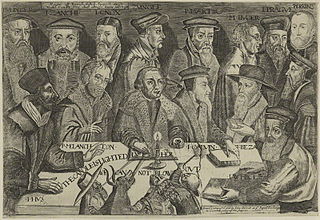
Calvinism originated with the Reformation in Switzerland when Huldrych Zwingli began preaching what would become the first form of the Reformed doctrine in Zürich in 1519.
Person Gobelinus was a historian from Westphalia and a reformer of monastic life in his native land.

The theology of Ulrich Zwingli was based on an interpretation of the Bible, taking scripture as the inspired word of God and placing its authority higher than what he saw as human sources such as the ecumenical councils and the church fathers. He also recognised the human element within the inspiration, noting the differences in the canonical gospels. Zwinglianism is the Reformed confession based on the Second Helvetic Confession promulgated by Zwingli's successor Heinrich Bullinger in the 1560s.

According to the Catholic Church, a Church Council is ecumenical ("world-wide"), if it is "a solemn congregation of the Catholic bishops of the world at the invitation of the Pope to decide on matters of the Church with him". The wider term, 'ecumenical council', relates to Church councils recognised by both Eastern and Western Christianity.

The Reformation in Zürich was promoted initially by Huldrych Zwingli, who gained the support of the magistrates of the city of Zürich and the princess abbess Katharina von Zimmern of the Fraumünster Abbey, and the population of the city of Zürich and agriculture-oriented population of the present Canton of Zürich in the early 1520s. It led to significant changes in civil life and state matters in Zürich and spread to several other cantons of the Old Swiss Confederacy, and thus initiated the Reformation in Switzerland.















